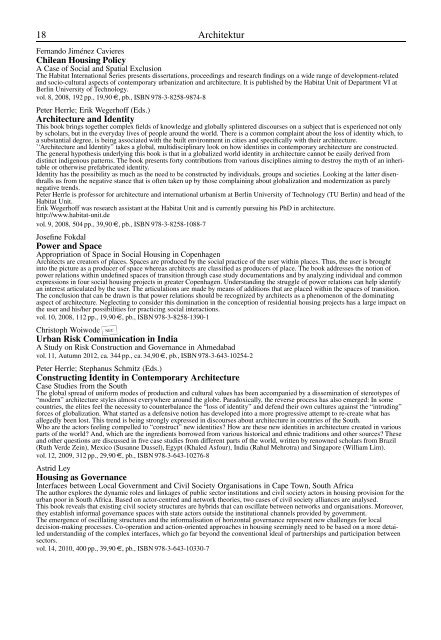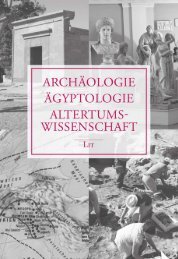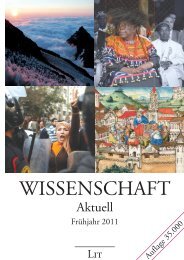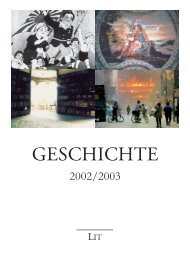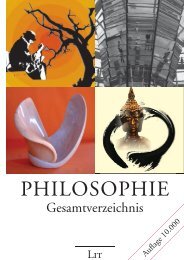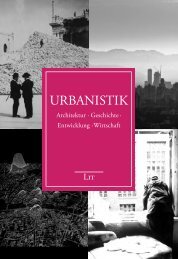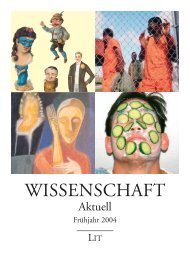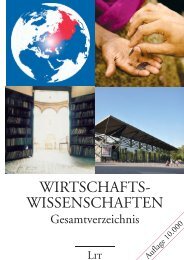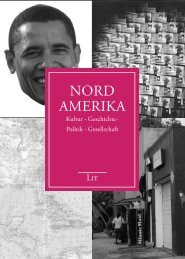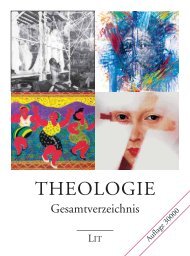Kunstgeschichte - LIT Verlag
Kunstgeschichte - LIT Verlag
Kunstgeschichte - LIT Verlag
Erfolgreiche ePaper selbst erstellen
Machen Sie aus Ihren PDF Publikationen ein blätterbares Flipbook mit unserer einzigartigen Google optimierten e-Paper Software.
18 Architektur<br />
Fernando Jiménez Cavieres<br />
Chilean Housing Policy<br />
A Case of Social and Spatial Exclusion<br />
The Habitat International Series presents dissertations, proceedings and research findings on a wide range of development-related<br />
and socio-cultural aspects of contemporary urbanization and architecture. It is published by the Habitat Unit of Department VI at<br />
Berlin University of Technology.<br />
vol. 8, 2008, 192 pp., 19,90 €, pb., ISBN 978-3-8258-9874-8<br />
Peter Herrle; Erik Wegerhoff (Eds.)<br />
Architecture and Identity<br />
This book brings together complex fields of knowledge and globally splintered discourses on a subject that is experienced not only<br />
by scholars, but in the everyday lives of people around the world. There is a common complaint about the loss of identity which, to<br />
a substantial degree, is being associated with the built environment in cities and specifically with their architecture.<br />
’‘Architecture and Identity” takes a global, multidisciplinary look on how identities in contemporary architecture are constructed.<br />
The general hypothesis underlying this book is that in a globalized world identity in architecture cannot be easily derived from<br />
distinct indigenous patterns. The book presents forty contributions from various disciplines aiming to destroy the myth of an inheritable<br />
or otherwise prefabricated identity.<br />
Identity has the possibility as much as the need to be constructed by individuals, groups and societies. Looking at the latter disenthralls<br />
us from the negative stance that is often taken up by those complaining about globalization and modernization as purely<br />
negative trends.<br />
Peter Herrle is professor for architecture and international urbanism at Berlin University of Technology (TU Berlin) and head of the<br />
Habitat Unit.<br />
Erik Wegerhoff was research assistant at the Habitat Unit and is currently pursuing his PhD in architecture.<br />
http://www.habitat-unit.de<br />
vol. 9, 2008, 504 pp., 39,90 €, pb., ISBN 978-3-8258-1088-7<br />
Josefine Fokdal<br />
Power and Space<br />
Appropriation of Space in Social Housing in Copenhagen<br />
Architects are creators of places. Spaces are produced by the social practice of the user within places. Thus, the user is brought<br />
into the picture as a producer of space whereas architects are classified as producers of place. The book addresses the notion of<br />
power relations within undefined spaces of transition through case study documentations and by analyzing individual and common<br />
expressions in four social housing projects in greater Copenhagen. Understanding the struggle of power relations can help identify<br />
an interest articulated by the user. The articulations are made by means of additions that are placed within the spaces of transition.<br />
The conclusion that can be drawn is that power relations should be recognized by architects as a phenomenon of the dominating<br />
aspect of architecture. Neglecting to consider this domination in the conception of residential housing projects has a large impact on<br />
the user and his/her possibilities for practicing social interactions.<br />
vol. 10, 2008, 112 pp., 19,90 €, pb., ISBN 978-3-8258-1390-1<br />
Christoph Woiwode NEU<br />
Urban Risk Communication in India<br />
A Study on Risk Construction and Governance in Ahmedabad<br />
vol. 11, Autumn 2012, ca. 344 pp., ca. 34,90 €, pb., ISBN 978-3-643-10254-2<br />
Peter Herrle; Stephanus Schmitz (Eds.)<br />
Constructing Identity in Contemporary Architecture<br />
Case Studies from the South<br />
The global spread of uniform modes of production and cultural values has been accompanied by a dissemination of stereotypes of<br />
“modern” architecture styles almost everywhere around the globe. Paradoxically, the reverse process has also emerged: In some<br />
countries, the elites feel the necessity to counterbalance the “loss of identity” and defend their own cultures against the “intruding”<br />
forces of globalization. What started as a defensive notion has developed into a more progressive attempt to re-create what has<br />
allegedly been lost. This trend is being strongly expressed in discourses about architecture in countries of the South.<br />
Who are the actors feeling compelled to “construct” new identities? How are these new identities in architecture created in various<br />
parts of the world? And, which are the ingredients borrowed from various historical and ethnic traditions and other sources? These<br />
and other questions are discussed in five case studies from different parts of the world, written by renowned scholars from Brazil<br />
(Ruth Verde Zein), Mexico (Susanne Dussel), Egypt (Khaled Asfour), India (Rahul Mehrotra) and Singapore (William Lim).<br />
vol. 12, 2009, 312 pp., 29,90 €, pb., ISBN 978-3-643-10276-8<br />
Astrid Ley<br />
Housing as Governance<br />
Interfaces between Local Government and Civil Society Organisations in Cape Town, South Africa<br />
The author explores the dynamic roles and linkages of public sector institutions and civil society actors in housing provision for the<br />
urban poor in South Africa. Based on actor-centred and network theories, two cases of civil society alliances are analysed.<br />
This book reveals that existing civil society structures are hybrids that can oscillate between networks and organisations. Moreover,<br />
they establish informal governance spaces with state actors outside the institutional channels provided by government.<br />
The emergence of oscillating structures and the informalisation of horizontal governance represent new challenges for local<br />
decision-making processes. Co-operation and action-oriented approaches in housing seemingly need to be based on a more detailed<br />
understanding of the complex interfaces, which go far beyond the conventional ideal of partnerships and participation between<br />
sectors.<br />
vol. 14, 2010, 400 pp., 39,90 €, pb., ISBN 978-3-643-10330-7


